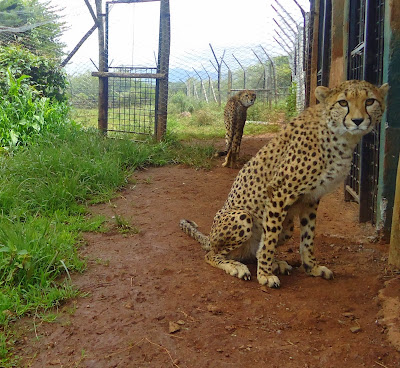11 October 2013
During a visit home-stay family we took an excursion to the
Born Free foundation just outside of Menagesha. When I lived there people would
tell me “there are lions here” as they pointed off to some obscure point in the
forest. I brushed them off, thinking they were re-telling fables, exaggerating
or mistranslated “lion” for a smaller wild feline (People often tell me about
the “tigers” in Bale, yet there are no tigers in Africa. I think they mean to
say leopard, but don’t know the difference). My friend Millian, a popular tourguide, works part time there and offered to show us the animal rehabilitation
center.
Born Free is an organization which rescues and rehabilitates
animals that have been taken from the wild as pets. The end goal is to
re-release them into the wild again if no injury or development issues prevent
it. I was struck by how serene and beautiful the compound was. I feared it
would seem like a zoo, but instead it was all natural vegetation with no
concrete. The confinements were spread apart from one another and the animals
were given abundant space in their areas. The walk in between animal habitats
was a short hike through brush and trees where Millian identified different
birds, rodents and the tortoises who languidly munched away.
Most of the animals were taken from Jijiga, the capital of Ethiopia's eastern Somalie region. This area has a lot of wild animals being taken as pets because it is close to the D'jibouti/Somalie border where they are taken across the Red Sea. The animals are frequently sold to wealthy Arabs in the Middle East. Most commonly this is the case with Cheetahs, who I learned are not that aggressive, but rather sweet, enormous house cats. As Millian was telling us how this group of cheetahs were discovered, he reached his hand into the fencing where two male cheetahs walked towards him and began purring as he scratched their ears. I asked if I could also try my luck at making a cheetah purr, and he winced explaining that since they aren't familiar with me it might not be very safe. I have never seen cheetahs so closely, and even as an animal enthusiast I have never fully appreciated, until now, how gorgeous they are. If I were wealthy and without better ethics I would also be tempted to own a cheetahs as a house cat.
We also saw 5 Abyssinian lions. Most of who will not be able to return to the wild due to the harm done from their previous owners.
One lion had striking blue eyes which I learned had been the result of nerve damage from a too-tight collar which the owners were afraid to adjust as the animals grew from a cub to an adult. The two mature males showed their stunning black manes, a unique feature of the Abyssinia lion found only in Ethiopia. Previously the original name for Ethiopia was Abyssinia, named after this rare sub-species. These lions are a national symbol known as the Lion of Judah, made most famous by Emperor Haile Sellassie and henceforth the Rastafarian community. Like the Cheetahs, I was struck by the beauty of these creatures, but refrained from sticking my hand into the fence to see if I could make them purr.
Born Free works throughout Ethiopia to control animal trafficking and also to support the Ethiopian Wolf Conservation Project. The day at their animal sanctuary was eye opening to see the commitment the organization is making to improve conservation of these precious African creatures.





No comments:
Post a Comment